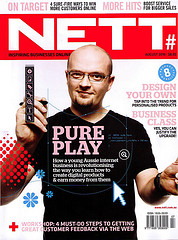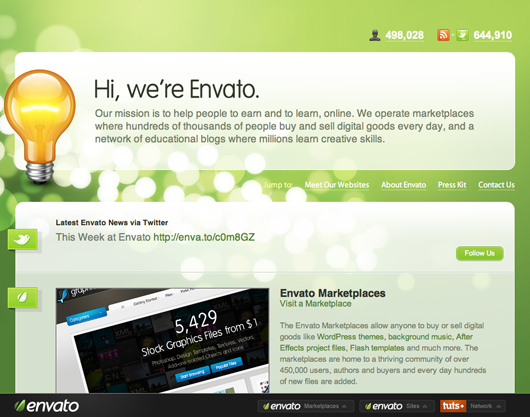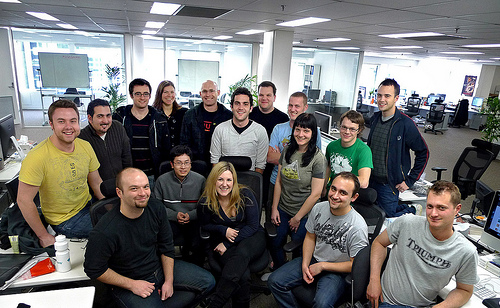This is part of our “Bootstrapped, Profitable, & Proud” series which profiles profitable companies with over $1 million in revenues that never took VC.
“Our outfit Envato was started by myself, my big brother, my wife and my best friend,” says Collis Ta’eed (pictured below on the cover of Nett magazine). “We put in a bit of money we each had and mostly just worked hard.” In this Q&A, Ta’eed answers questions about Envato and its path to success. He will also be answering reader questions today (Oct 7) in the comment thread so feel free to ask a question!
What does your company do?
We do two main things: First we run sites that help people earn an income. These are our biggest sites in revenue and include ThemeForest which is the largest marketplace for buying and selling website templates and WordPress themes. In the early days selling with us would just be a sort of hobby income. Then after a while there were a few people who actually could manage to earn a living. These days there are guys earning, quite literally, tens of thousands of dollars a month. These sites are called the Envato Marketplaces, and there are 7 of them, with an eighth launching three days from the time I am writing this :-)
 The second part of what we do is a set of sites to help people learn professional creative skills. These are our biggest sites in traffic and include Psdtuts+ which is the largest Photoshop tutorial site online. We also have tutorials published on a variety of other subjects including audio production, motion graphics, illustration, photography, mobile development and web development. The full network is called Tuts+ and there are nine sites with a tenth launching in a couple of months.
The second part of what we do is a set of sites to help people learn professional creative skills. These are our biggest sites in traffic and include Psdtuts+ which is the largest Photoshop tutorial site online. We also have tutorials published on a variety of other subjects including audio production, motion graphics, illustration, photography, mobile development and web development. The full network is called Tuts+ and there are nine sites with a tenth launching in a couple of months.
So learning and earning is what we do chiefly.
But we also operate a few other sites and services including Creattica which is one of the biggest design galleries online, FreelanceSwitch which is the biggest and oldest blog dedicated to freelancing, and AppStorm which is a very rapidly growing set of app review blogs that includes Mac.AppStorm, the largest blog dedicated to Mac Apps.
So basically, we do a lot of stuff :-) As you might imagine it’s difficult explaining to someone at a dinner party who casually asks what we do for a living.

How did the business get started?
Back in 2006, our plans were much more modest. We actually just wanted to build a marketplace for buying and selling Adobe Flash. At that time I used to sell my files on iStockPhoto, but as you would assume from the name, they didn’t give a lot of attention to Flash guys.
So we planned out a marketplace called FlashDen, and I put up a job ad for a PHP developer. But instead we got an email from a developer I had briefly known at an old job whose email text was quite literally “Pick me, pick me!” When I called him he told me that PHP was really not what we should use, rather we should build the project in this thing called Ruby on Rails which he’d gotten into. Back in February of 2006, Rails was still pretty new, but I trusted Ryan and we went for it.
Using Ruby was one of the best cultural decisions we made as it brought us to using test driven development, version control, and a lot of agile techniques. These days here in Melbourne, Australia we operate one of the largest, most respected Ruby outfits.
How much cash did you need to get up and running?
So to get started we spent about $40,000 or so, plus a lot of sweat and hard work. The money came from the cofounders’ savings and was pretty much the sum total of those savings!
Early on the project didn’t go as we’d hoped. By July we’d burned through all the money, exhausted our credit cards, and were busy working our freelance design jobs as well as trying to build and work on FlashDen at night time. For a little while there I recall wondering if the whole thing was going to flop.
But happily by August we chopped out a lot of the ‘nice to have’ features, cleaned it all up a bit and managed to launch.

Ta’eed: “Back in late 2009 after we’d moved to the new office in Melbourne.” Back row, L to R: James, Naysan, Oz, Justine, Lucas, Stu, Rod, John, Skellie, Erin, Jordan. Front row seated, L to R: Collis, Fred, Cyan, Vahid, Ryan.”
Continued…

 37signals Team – I just listened to your audio book – twice! It was affirming to me because a lot of your recommendations are things I am already doing or have done…
37signals Team – I just listened to your audio book – twice! It was affirming to me because a lot of your recommendations are things I am already doing or have done… The second part of what we do is a set of sites to help people learn professional creative skills. These are our biggest sites in traffic and include
The second part of what we do is a set of sites to help people learn professional creative skills. These are our biggest sites in traffic and include 

